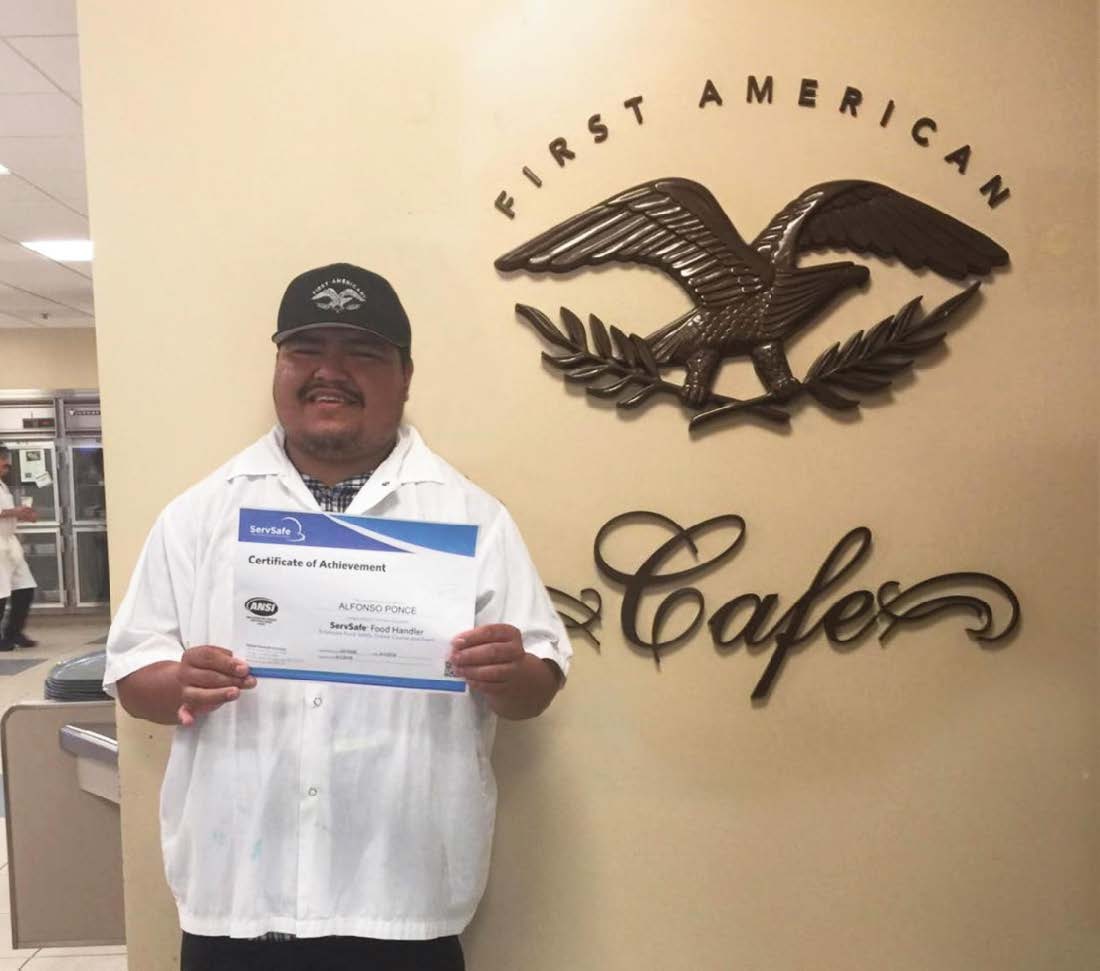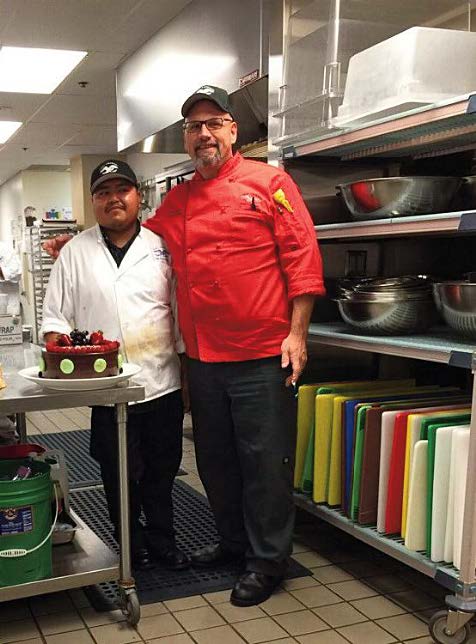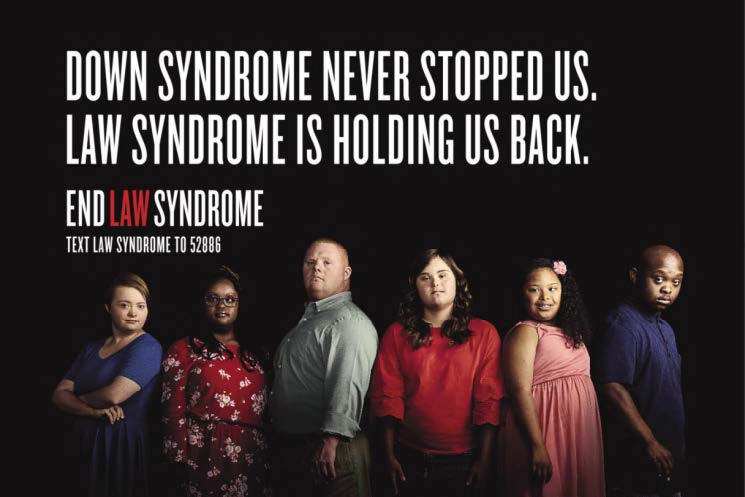
The kitchen in the café at First American Financial Corporation where Elizabeth Martinez serves as job coach for Brian Hirayama, Daniel Martinez, and Alfonso Ponce—three young men with developmental disabilities—is a showcase for true integration of people with disabilities into the work force. Alongside co-workers without disabilities, these men perform their duties with pride and professionalism, helping the First American Café serve more than 1,000 people per day. The support, encouragement and lessons they receive from Elizabeth have been key to their workplace success, as well as the personal growth they have experienced as a result of their employment.
"I love seeing them grow every day," said Elizabeth, an Anaheim, California resident who was the 2017 recipient of Regional Center of Orange County's (RCOC) Direct Support Professional Spotlight Award. "It's amazing to see them overcome their fears, and become more verbal and more confident. I know they can do anything they put their minds to!"
Now in her third year as a job coach with Goodwill of Orange County (one of several agencies that RCOC pays, on behalf of the State of California, to provide supported employment services), Elizabeth began college as a criminal justice major. After an internship in that field, however, she decided it wasn't the career for her and switched to sociology. Around the same time, a family member's baby was born with cerebral palsy and epilepsy. That personal experience convinced Elizabeth that helping people with disabilities to overcome their challenges would be her life's work and her passion.
THREE FACTORS IN WORKPLACE SUCCESS
Professionals like Elizabeth – who love their work and who go the extra mile every day to serve people with developmental disabilities – are vital to the success of California's regional center system of community care and developmental services systems throughout the United States.
Equally important in this mix are employers like First American that step up and provide truly integrated work places where adults with developmental disabilities can succeed. First American has been a role model in the Southern California community, having embraced the developmental disabilities community for the better part of the last decade. In addition to the three men Elizabeth Martinez supports in the company's employee Café, First American employs a team of adults with disabilities that handles important escrow and other financial documents by preparing the files, scanning documents, and distributing them to the appropriate departments.
And even before the job coaches and employers enter the picture, effective adult transition programs at the schools there provide invaluable support by building functional skills, such as learning to take public transportation, and work skills like using a computer, time management and business etiquette. Just as importantl, an effective transition program also paints a picture that helps agencies like RCOC and others on the individual's planning team to truly understand that student's skills and interests. Ideally, a student is able to gain actual work experience in their desired field, which can enable them to go directly from their transition program into a competitive, integrated job in the community.

NOW WE'RE COOKING: (Above) Alfonso with Executive Chef Dore Sommer. Working in a restaurant was always Alfonso's dream and he was able to get restaurant experience through his transition program. (Opposite page) Alfonso proudly displays his American National Standards Institute certificate in the Café kitchen.
ONE YOUNG MAN'S DREAM JOB
It is truly inspirational to see how all of these factors for workplace success came together for Alfonso, who began working at the First American Café following his transition program at Edison High School in Huntington Beach, California. According to Alfonso, working in a restaurant was always his dream and he was able to get restaurant experience through his transition program. At the Café, his duties are diverse, ranging from washing dishes, emptying the trash, and sweeping to folding boxes, organizing
produce, and cleaning the walk-in freezer. His favorite part of the job, though, is washing the dishes and putting them in the dishwasher. Anyone visiting the kitchen at the First American Café could be forgiven for not recognizing sociable, confident and independent Alfonso, as the same person who began working at the Café just a couple of years ago.
His job coach considers Alfonso's transformation nothing short of remarkable. "He used to be timid and shy," Elizabeth said. "He would barely speak to you then, but I've seen him grow tremendously. Having a disability hasn't prevented him from working and doing a good job."
INTEGRATED EMPLOYMENT AND PERSONAL GROWTH
Elizabeth pointed to similar perNOW WE'RE COOKING: (Above) Alfonso with Executive Chef Dore Sommer. Working in a restaurant was always Alfonso's dream and he was able to get restaurant experience through his transition program. (Opposite page) Alfonso proudly displays his American National Standards Institute certificate in the Café kitchen. sonal growth on the part of Daniel and Brian, both of whom have autism.
Daniel, who started working at the Café at same time as Alfonso, was also very quiet and avoided eye contact, but that has all changed. "Now he communicates very well with me," Elizabeth said. "He makes eye contact, and if he has a concern, he shares it with me."
The confidence he has gained from work and the daily encouragement he gets from Elizabeth to always look for ways to improve himself, also inspired Daniel to return to school. He now attends Irvine Valley College (a local community college) when he's not working, and recently got 10 out of 10 correct on his first class quiz.
Brian, who joined the team more recently, has nonetheless made great strides in learning to forge relationships with co-workers at the Café, and has blossomed with Elizabeth's support. Of Japanese descent, Brian amazes his co-workers with his fluency in four languages – Japanese, English, Spanish and Chinese. He is even teaching others in the kitchen to speak Japanese. He has also learned to be more focused on the job, and has developed good listening skills, which help him to be successful at the Cafe.
GRATEFUL FOR THE OPPORTUNITY TO WORK
All three men take great pride in their work, are punctual and respectful, and regularly share their gratitude for the opportunity to work and earn a paycheck.
"They are very thankful for the opportunities they have," Elizabeth said. "And I'm thankful for them – they help me to grow and succeed as well."
Clearly proud of her team's extraordinary personal growth, as well as their work ethic and job performance, Elizabeth applauded the Café's Executive Chef Dore Sommer for providing a positive work environment.
"Chef Dore is very supportive and treats my guys the same as other employees," she said. "He makes them all feel like they can accomplish things."
PROUD FAMILIES EMBRACE WORK
The young men's parents have also noticed the positive effects of their having jobs in an integrated setting in the community. "He takes the public bus to work all by himself," said Alfonso's mother Estela Ponce, noting that she used to have to wake him up in the morning, but now he uses an alarm to make sure he wakes up early enough to get to work on time. "He even takes his work clothes to the dry cleaner to wash."
"I never ever thought Alfonso would work, and I am so proud of him," she continued, noting that he is well-liked at work because he is a good worker, responsible in his job, and polite. "Of seven sons I have raised, he is the best. Even his brothers admire him so much!"
REPLICATING WORKPLACE SUCCESS
The supportive and fair-minded approach taken by Chef Dore – and by First American's Vice President of Operations Frank LaBlanc, who oversees the company's other team of workers with disabilities— is one that all employers would do well to adopt. It is a sensible and laudable example for engaging with both typical employees and employees with disabilities. We can never have too many job coaches like Elizabeth, who exude positivity, demonstrate the positive behaviors that lead to workplace success, and actively cultivate the abilities of every individual on their teams to grow and achieve.
Most important, though, are the individuals with disabilities we serve. Brian, Daniel, Alfonso, and countless others set an example that helps to open the eyes of other prospective employers regarding the contributions that people with developmental disabilities can make in the workforce.•
ABOUT THE AUTHOR: Larry Landauer is Executive Director of Regional Center of Orange County (rcocdd.com), in Southern California. RCOC is the private non-profit organization contracted by the State of California to coordinate services and supports to the more than 20,000 Orange County residents with developmental disabilities.
National Down Syndrome Society Launches National Campaign Spotlighting Laws that Prevent Individuals with Down Syndrome from Seeking Careers
The National Down Syndrome Society (NDSS), a human rights organization for all individuals with Down syndrome, will soon bring together community leaders, self-advocates, parents and employers to launch their latest campaign – Law Syndrome. NDSS' Law Syndrome campaign will help launch October as Down Syndrome Awareness Month and National Disability Employment Awareness Month.
Law Syndrome directly addresses the challenges faced by people with Down syndrome who desire to fulfill career goals, get married and live independent, productive lives. However, by doing so, individuals often jeopardize critical government support such as healthcare, housing and education. The current system is plagued by outdated laws, created at a time when our society was less accepting of individuals with Down syndrome and other disabilities. These laws often discourage people with Down syndrome from following their dreams and enhancing their quality of life. Thus, NDSS is leading a national effort to showcase to the world that Down syndrome doesn't stop people with Down syndrome – instead, it's Law Syndrome that holds them back.
"Individuals with Down syndrome are disincentivized from pursuing meaningful careers because of the fear of losing access to live-saving benefits like Medicaid," said NDSS President Sara Hart Weir. "NDSS, by launching Law Syndrome, is calling on our leaders in the United States Congress to join our efforts to reform these complex laws and help us change Law Syndrome." Currently, the poverty rate for workingage people with disabilities is 22.3 percent higher than those without disabilities. Despite the intent of key civil rights laws, including the Americans with Disabilities Act and the Stephen Beck Jr., Achieving a Better Life Experience Act, individuals with Down syndrome still face barriers to living as full contributiors to their communities."Employment is a human right, and that is why NDSS is proud to launch Law Syndrome," said Weir.
Not only are people with Down syndrome living longer, healthier and more productive lives, but they are also more integrated into the fabric of society than ever before. Many pursue post-secondary education programs, get married and obtain rewarding employment. NDSS' Law Syndrome campaign will break down barriers that unfairly prevent people with Down syndrome from pursuing the American dream.
The new campaign aims to shed light on misconceptions that are not addressed by current federal public policy. NDSS' Law Syndrome campaign will help give all individuals with Down syndrome, their families, the disability community at large, and the general public a voice in confronting these dated beliefs. NDSS has produced a multifaceted public service announcement including a video, creative pieces and a website, to provide a platform for the public to encourage United States Congressional leaders to act. For more information on the Law Syndrome campaign or to get involved, please visit lawsyndrome.org
For more information on the Law Syndrome campaign or to get involved, please visit lawsyndrome.org
A NEW "LAW SYNDROME" CAMPAIGN IS AIMED AT BREAKING DOWN BARRIERS TO MEANINGFUL CAREERS FOR ALL INDIVIDUALS WITH DOWN SYNDROME"
